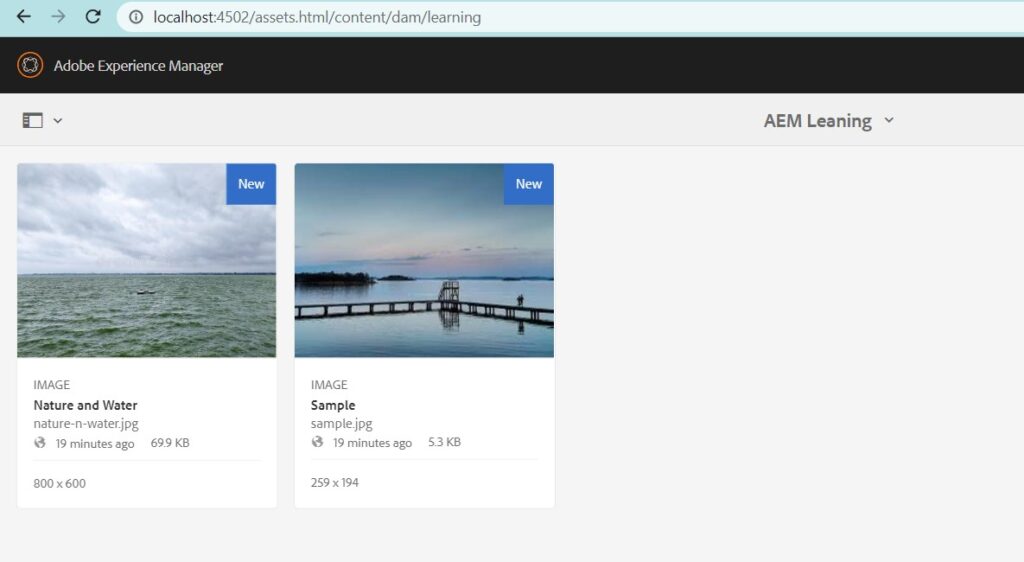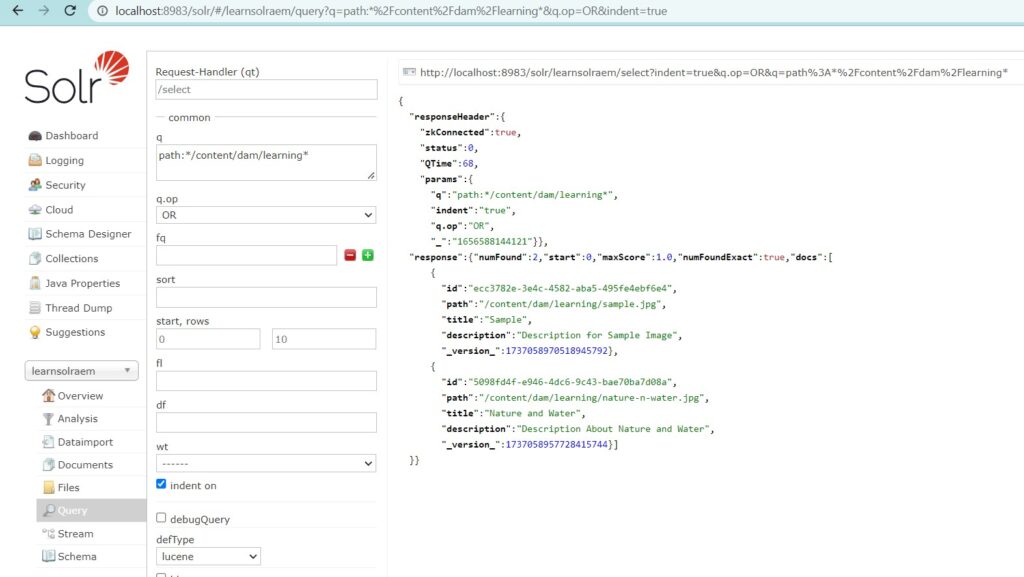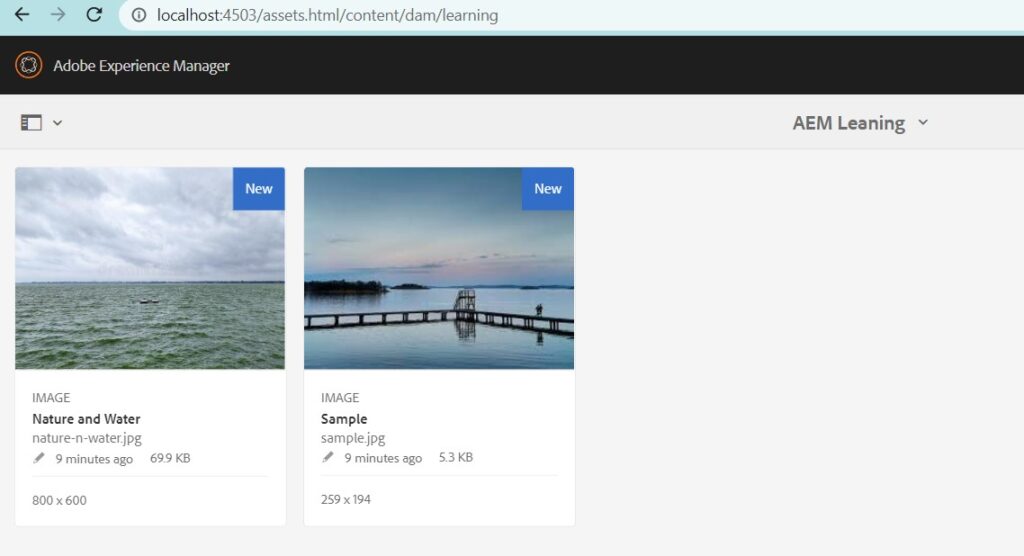Contents
Objective
After reading this Article, You should have an Understanding of –
- Replication Event Listener in AEM
- Solr indexing of AEM asset or page data automatically
Introduction
In AEM, we mostly work with assets and pages. Sometimes the scenario comes to publish the content and it automatically indexes the data to Solr for better search implementation. We can achieve this with the help of the Replication Event Listener. When we press the publish button, the Event Listener will trigger and send the necessary data to the Solr Collection.
Hence, without any further delay, let’s get started:
Dependency required for Solr implementation in AEM
Dependency in core pom.xml
<dependency>
<groupId>org.apache.servicemix.bundles</groupId>
<artifactId>org.apache.servicemix.bundles.solr-solrj</artifactId>
<version>8.11.1_1</version>
</dependency>
<dependency>
<groupId>org.apache.servicemix.bundles</groupId>
<artifactId>org.apache.servicemix.bundles.zookeeper</artifactId>
<version>3.7.0_1</version>
</dependency>
Dependency in all pom.xml
<embedded>
<groupId>org.apache.servicemix.bundles</groupId>
<artifactId>org.apache.servicemix.bundles.solr-solrj</artifactId>
<target>/apps/learning-packages/application/install</target>
</embedded>
<embedded>
<groupId>org.apache.servicemix.bundles</groupId>
<artifactId>org.apache.servicemix.bundles.zookeeper</artifactId>
<target>/apps/learning-packages/application/install</target>
</embedded>
Replication Event Listener for indexing content and asset data to Solr
The Replication Event Listener is an event handler that triggers when you publish any content in AEM. The below event handler shows the solr implementation and indexing. Here we are sending some basic data (i.e. id, path, title, and description) to Solr. Further, we can use the same data for search functionality. So let’s see the implementation code.
SolrEventHandler.java
package com.adobe.learning.core.listeners;
import com.day.cq.replication.ReplicationAction;
import org.apache.commons.lang3.StringUtils;
import org.apache.sling.api.resource.*;
import org.apache.solr.client.solrj.SolrClient;
import org.apache.solr.client.solrj.SolrServerException;
import org.apache.solr.client.solrj.impl.HttpSolrClient;
import org.apache.solr.common.SolrInputDocument;
import org.osgi.framework.Constants;
import org.osgi.service.component.annotations.Component;
import org.osgi.service.component.annotations.Reference;
import org.osgi.service.event.Event;
import org.osgi.service.event.EventConstants;
import org.osgi.service.event.EventHandler;
import org.slf4j.Logger;
import org.slf4j.LoggerFactory;
import java.io.IOException;
import java.util.HashMap;
import java.util.Map;
/**
* @author Shiv
*/
@Component(service = EventHandler.class, immediate = true, property = {
Constants.SERVICE_DESCRIPTION + "= DAM Asset Events for Solr Indexing",
EventConstants.EVENT_TOPIC + "=" + ReplicationAction.EVENT_TOPIC,
EventConstants.EVENT_FILTER + "=(paths=/content/dam/*)"})
public class SolrEventHandler implements EventHandler {
private static final Logger LOGGER = LoggerFactory.getLogger(SolrEventHandler.class);
private static final String SYSTEM_USER = "system_user";
private static final String METADATA_CONSTANT = "/jcr:content/metadata";
@Reference
ResourceResolverFactory resourceResolverFactory;
ResourceResolver resourceResolver;
@Override
public void handleEvent(Event event) {
try {
//Getting Replication Options from Event
ReplicationAction replicationAction = ReplicationAction.fromEvent(event);
String assetPath = StringUtils.EMPTY;
//Getting Resource Resolver from system user for ValueMap
Map<String, Object> param = new HashMap<>();
param.put(ResourceResolverFactory.SUBSERVICE, SYSTEM_USER);
resourceResolver = resourceResolverFactory.getServiceResourceResolver(param);
if (replicationAction != null) {
//Getting asset path which we are publishing
assetPath = replicationAction.getPath();
//Getting Resource and ValueMap for uuid
Resource parentResource = resourceResolver.getResource(assetPath);
assert parentResource != null;
ValueMap parentValueMap = parentResource.getValueMap();
//Getting Resource and ValueMap for asset Metadata
Resource resource = resourceResolver.getResource(assetPath + METADATA_CONSTANT);
assert resource != null;
ValueMap valueMap = resource.getValueMap();
//Connecting to Solr Collection using Solr Client
SolrClient solrClient = new HttpSolrClient.Builder("http://localhost:8983/solr/learnsolraem").build();
//Add all properties that we want to send to solr
SolrInputDocument solrInputFields = new SolrInputDocument();
solrInputFields.addField("id", parentValueMap.get("jcr:uuid", String.class));
solrInputFields.addField("path", assetPath);
solrInputFields.addField("title", valueMap.get("dc:title", String.class));
solrInputFields.addField("description", valueMap.get("dc:description", String.class));
solrClient.add(solrInputFields);
//Commit the data to solr
solrClient.commit(true, true);
LOGGER.info("Document is updated to Solr Successfully");
}
LOGGER.info("Event Path : {}", assetPath);
} catch (SolrServerException | IOException | LoginException e) {
LOGGER.error("Error in Replication Event : {}", e.getMessage());
}
}
}
Conclusion
- So in this post, we tried to index asset data to Solr using event handler. Same we can use for pages and packages as well. I hope you enjoyed this post. If you find it useful, leave us a comment. I would love to hear your thoughts and suggestions to make it better. Also, you can connect with me on LinkedIn, Instagram or Facebook. All links are active now.




Very informative and explained very well.
cialis uk https://canadianpharmaceuticalsonline.home.blog/
You explained this really well!